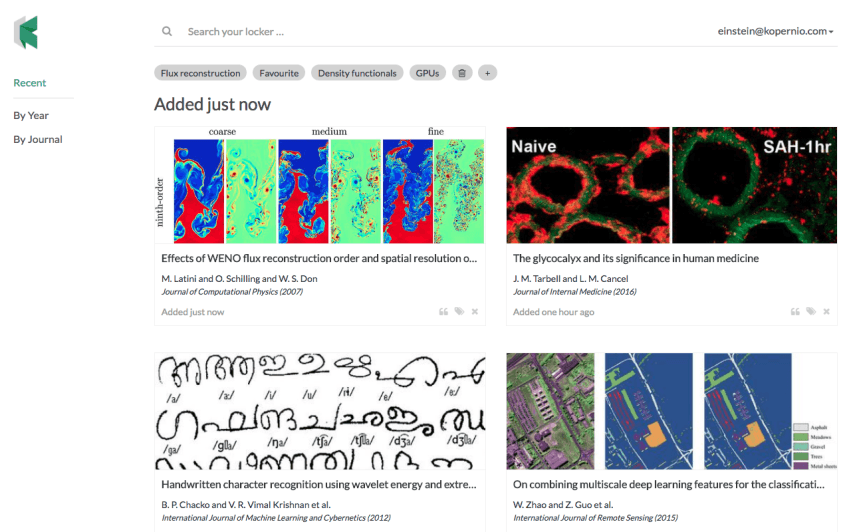In October of last year, Jan Reichelt left Mendeley, the academic social network he co-founded. He had stayed on with the company after it was acquired by publisher Elsevier in 2013 for a reported price tag between $70-100 million.
Since leaving he has invested in edtech startups but has had a burning desire to fix the issue of accessibility and convenience in PDF research papers.
“I felt like there were too many other problems still in this industry that need to be addressed and need to be solved. It’s inherently difficult to solve these problems within a big company,” he told tech.eu. This has led him to start Kopernio with Ben Kaube, co-founder of media monitoring startup Newsflo (also acquired by Elsevier in 2015).
This problem stems from the circuitous and time-consuming routes that researchers have to take to get their hands of journal articles even when their institutions have subscriptions. Kopernio is developing a browser plugin that manages institutions’ and researchers’ subscriptions and legitimate access to journal papers from sources like Elsevier’s ScienceDirect, PubMed, and Google Scholar.
Managing various logins and weaving through different pop-ups and redirects is a “big mess”, said Reichelt, but the Kopernio plugin will strip the process down to one click, according to the cofounder.
“The tool figures out intelligently that you want to get access to PDF documents when you browse and when you want access to a PDF document, it gives you that access based on the researcher’s contacts, institutional affiliation and so forth.”
The array of different publishers that act as gatekeepers to research, and the movement that pushes for greater open access, has created this situation.
Sci-Hub, often dubbed the Pirate Bay of academic journals, has become a significant thorn in the side of research publishers. The site provides an easy pathway to dozens of portals for quick access to articles and papers with just a couple of clicks. Operating out of Kazakhstan, the site has evaded authorities by switching domains regularly, a tactic that was commonly used by The Pirate Bay.
Publishers like Elsevier and the American Chemical Society have all taken legal action against Sci-Hub in an attempt to stymie the site and what they describe as a flagrant disregard for copyright. In some cases, the publishers have been awarded millions of dollars in damages; but the likelihood of ever actually seeing that money is slim and none. Most recently, Elsevier and its peers have sought to have the site blocked by ISPs.
Whatever the outcome, the likes of Sci-Hub symbolise a very real problem – the lack of convenience.
“It’s very easy to access content at the moment if you use Sci-Hub, even though you might be at Harvard or Imperial College,” explained Reichelt.
A report from Science last year attempted to delve into how Sci-Hub is used around the world and based on the available data, it found that the “most intense use” of the site is from academic institutions in Europe and North America, the very places that likely have legit subscriptions anyway.
“Even though those institutions theoretically have access to the content, it’s very inconvenient to get to because of all these clicks and redirects. The industry makes it very difficult for people to get access to content even if it’s paid for already,” said Reichelt.
Kopernio wants to jump into the gap between traditional journal subscriptions and the one-click simplicity of Sci-Hub.
“Hopefully we can dial down some of the illegal use of research papers and make the industry a better place and deliver what the music industry already ten years ago.”
It’s a tired comparison but Kopernio aims to be the ‘Spotify of’ academic research: “You look at consumer industries, say Spotify or YouTube, you get everything with one click. Why can’t we achieve something similar for the academic world?”
In the same way that Spotify is an easy way to access all artists, regardless of record label or rightsholder, Kopernio wants to create a similar ease for legitimate subscribers to academic papers – “Especially because a lot of the content is already being paid for by the institutions.”
“I think a big problem in this industry is that very few people are looking after the end users, looking after the researchers, and that’s not to blame anyone but I think that’s where the strength of my and Ben’s history comes in. We’re very good at understanding the end users.”
Kopernio is now exploring different business models. One is a freemium model for researchers, much like Mendeley’s, for storing and accessing more and more papers or integrating with file sharing services. The other is an analytics feature for universities and institutions, allowing them to see statistics on what topics and areas are gaining the most traction.
Kopernio has been floating under the surface since launching earlier this year with Reichelt and Kaube working on the startup full-time alongside two part-time staff. It’s spread largely through word of mouth among researchers and universities but has grown to a couple of thousand users, Reichelt said: “Those numbers are quite encouraging, that the solution truly works.”
Next steps? Possible funding to begin scaling this rather small operation into something more significant.
“Given the track record that both Ben and I have, having both built and exited companies in this space previously, we have a good network,” said Reichelt on possible contact with investors.
“This is something, probably in the next couple of weeks, I’m not sure if we can get it done before Christmas but certainly thereafter to look into taking on some funding. That’s certainly the next step in terms of how to grow and scale the company,” he said.
Either way, the company is eager to make a dent in the way researchers access papers, but it will still take some time for the academic world to catch up with the model that has become the norm in the music industry – “We’re a little bit behind.”





Would you like to write the first comment?
Login to post comments